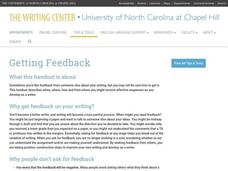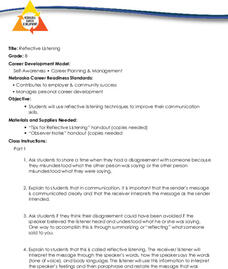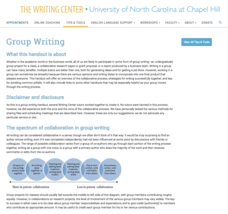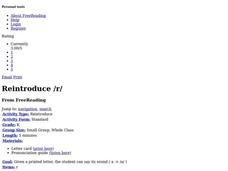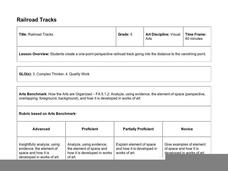Annenberg Foundation
Utopian Promise
Scholars learn all about the Puritans in the third installment of a 16-part lesson series. After watching a video, they read and discuss biographies of Puritans and Quakers from American history, write journal entries and poetry, and...
Houghton Mifflin Harcourt
Home Sweet Home: English Language Development Lessons (Theme 5)
Through grand discussion, picture cards, and poems, enhance language proficiency with a Home Sweet Home themed unit created to support English language development. Each lesson follows a listen, speak, move, and/or look routine that...
University of North Carolina
Conciseness
Twitter has helped people learn to express their ideas in as few words as possible, but away from the 280-character limit, writers still struggle with keeping their writing short and to the point. Conciseness is the focus of a writing...
University of North Carolina
Word Choice
Words matter, particularly in academic writing. Issues such as vague language, wordiness, and cliches make it difficult to get a point across. Part of a larger series to improve writing skills, the handout on word choice shows writers...
University of North Carolina
Getting Feedback
As many writers know, you are your own worst editor. The 10th installment in the Writing the Paper series explains that getting feedback from others is crucial to the writing process. The handout highlights the best time to ask others to...
EngageNY
Text to Film Comparison: Taking a Stand at the Jailhouse (Chapters 14-15)
Readers look closely at Scout in chapter 15 of To Kill A Mockingbird. Learners use turn and talk and Analyzing Scout's and the Reader's Perspectives Note-catcher to compare their perspectives to Scout's. They then make a comparison to...
EngageNY
Reading for Gist, Answering Text-Dependent Questions, and Determining Author’s Purpose: Industrial Food Chain
A Reading Closely: Guiding Questions handout leads readers to discover the gist of The Omnivore’s Dilemma. While reading, pupils look closely at the words in the text and discuss their meaning. They use dictionaries when needed to answer...
EngageNY
Mid-Unit Assessment: Analyzing Author’s Purpose in Speech and Text
Part one of a mid-unit assessment relating to The Omnivore’s Dilemma includes listening to and analyzing a speech by Birke Baehr. Part two involves analyzing an excerpt from the text. The assessment ends with short response questions.
EngageNY
Building Background Knowledge: The Dinka and Nuer Tribes Until the Mid-1980s (“Sudanese Tribes Confront Modern War” Excerpt 1) (Version 1)
Readers consider comparisons between the Dinka and Nuer tribes in South Sudan, making connections between an informational article about Sudanese tribes and the novel A Long Walk to Water by Linda Sue Park. They annotate the text to help...
EngageNY
Introducing “Comprehending the Calamity”
Some things are beyond comprehension. Scholars read an excerpt from "Comprehending the Calamity," a primary source text about the 1906 San Francisco earthquake. After identifying the gist, pupils complete anchor charts to analyze how the...
EngageNY
Finding the Gist of the Immediate Aftermath: Excerpt of “Comprehending the Calamity”
Brace for the aftershocks! Scholars read an excerpt from a primary source document about the immediate aftermath of the 1906 San Francisco fire and earthquake. Next, pupils complete an anchor chart, analyzing how the author introduces,...
EngageNY
End of Unit 2 Assessment: Final Literary Analysis
Get ready to review and revise! Scholars peer edit each other's literary analysis essay drafts. Next, using peer and teacher feedback, pupils compose their final drafts.
Thoughtful Learning
Adjusting Your Writing Voice
"Yo, what's up?" "Nuttin!" While such a dialogue might be appropriate between friends, it would be ill-advised in more formal situations. A mini-lesson asks young writers to consider how to adjust the voice they use to bring their...
Nebraska Department of Education
Reflective Listening
Reflective listening is not casual! After learning about the practice of reflective listening, middle schoolers practice reflective listening skills in a role play activity that has them take turns being a speaker, listener, and observer.
University of North Carolina
Group Writing
Two heads are better than one, especially during the writing process. Sometimes, scholars benefit from participating in group writing assignments, as one of the handouts in a series on specific writing assignments outlines. The process...
Curated OER
Point Of View Poem
Young scholars discuss a chapter from the book, The Phantom Toll Booth. They choose a common object and attempt to examine it from a different point of view. Using Kid Pix, students create a slide show for each line of their poem.
University of North Carolina
Psychology
Psychology, the scientific study of the human mind and behavior, is a popular major for many college students. An informative handout outlines common assignments in psychology courses. Scholars see how to design a research proposal,...
Curated OER
Cooking Skills: Special Education
Using the microwave, boiling water for pasta, and using a knife to make a sandwich are all independent living skills. Prepare your special needs students for life by having them prepare three easy-to-cook items. Each skill is laid out as...
Scholastic
Study Jams! Ordered Pairs
Using an amusing amusement park, Sam describes how it is a coordinate plane and how to graph an ordered pair. Perfect for beginners, the animation moves on to point out a tip using the first quadrant of an empty coordinate plane.
Curated OER
Taming the Wild Wiki
Take a look at the credibility of online sources such as Wikipedia. Discussion points and handouts are included to facilitate a meaningful and informative dialogue. Tips are given on how to determine if a Wikipedia article is reliable...
Curated OER
Reintroduce /r/
The /r/ sound can be a difficult one, but scholars use some helpful tips to get it right. After examining the letter shape they listen to you pronounce this phoneme and describe what you are doing to create the sound. They try on their...
Curated OER
Reintroduce /l/
Connect letter recognition, pronunciation, sound, and word examples to give scholars a solid grasp on the letter l. They watch you draw a large l on the board and make the /lll/ sound. Using your tips, they try the sound on...
Hawaiʻi State Department of Education
Railroad Tracks
Ahhh the vanishing point! Sounds ominous, but it's not. Fifth graders analyze the use of perspective in Renaissance art. They practice using linear perspective to draw railroad tracks that seem to go on forever. Tip: Make this...
Curated OER
Introduce /m/
Start by drawing a large letter m on the board for scholars to see. Do they know what letter this is? Once you've demonstrated the sound it makes, use these tips to help them make the same sound. There is even an audio...




